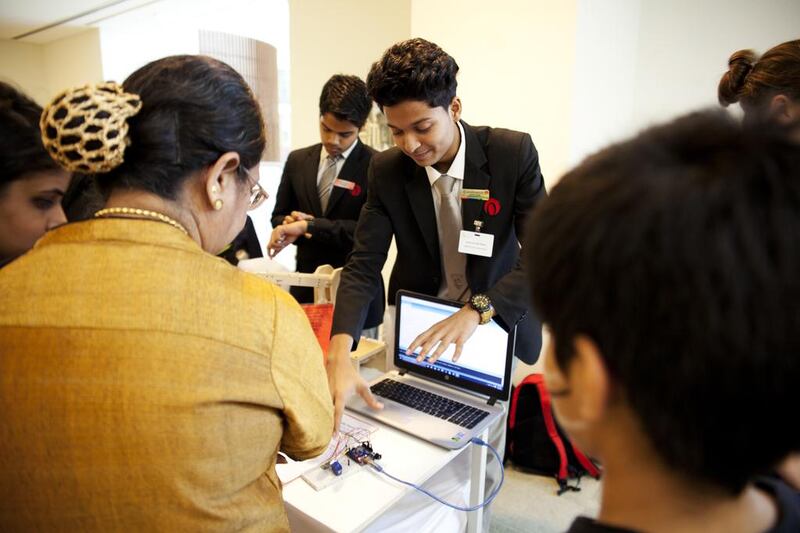DUBAI // Arabic teachers from across the emirate have discovered that giving children a helping hand – literally – makes learning a language a lot easier.
More than 50 teachers were given a demonstration on how the Gesture Responsive Teaching technique could help youngsters remember foreign letters and words if they were linked to hand movements rather than writing down what they learnt in a book.
GRT was developed by Gabrielle Zhou Liang, head of languages at Avondale Grammar School in Singapore, as a way of making Mandarin more accessible for young non-native speakers.
“We have a lot of western nationals at the school so it is a challenge to get their interest in the subject,” she said.
Children aged three to eight were shown different words or letters and were involved with coming up with hand gestures to represent each one.
“The children link the speaking of the word with the gesture and that makes it easier for them to remember,” said Ms Liang.
Four or five new words were added each week along with sentence structure. By the end of the course the pupils were comfortable using what they had learnt in basic conversations.
“We don’t get them to even start writing words until after the age of nine,” she said.
“We have found that if you push children too soon in learning a new language they will become discouraged when they make mistakes and their level of enthusiasm will drop.”
The language lessons ran for between 30 and 45 minutes every day over three weeks.
Ms Liang was speaking at the What Works Fusion conference organised by the Knowledge and Human Development Authority at the Sheikh Mohammed bin Rashid Medical Centre, in Dubai Healthcare City on Monday.
Her presentation was welcomed with interest by Arabic teachers.
Douaa Nejmah, head of Islamic Studies at English College Dubai, said the gesture response system could easily be adapted for Arabic. “It was very interesting to see how engaging children by getting them to come up with their own gestures for letters and words can help with learning,” she said.
“When you get children involved in their lesson in such a way they tend to enjoy it more and, as a result, learn better.
“We would have to make adjustments because in Arabic we join letters together differently to Mandarin but I think the fundamentals are all still there.”
Karen Davies, headteacher at Manor Primary School in Dubai, believed not pushing children to learn how to write a new language too soon would have long-term benefits.
“Instead of focusing on writing but getting children to speak the words instead makes it far more likely that the information will stick,” she said. “We have a similar system in the UK called ‘Talk for Writing’, and I know that has made a difference in how languages are taught. The great thing about this is that not only are children learning a language but they are developing skills in collaboration and creativity.”
Maha Ezzat, an Arabic teacher for non-native speakers at Greenfield Community School, said some of the ideas had already been adopted.
“Our curriculum is a little more demanding regarding getting children to learn how to write Arabic but once they enjoy the process they are eager to learn more,” she said.
nhanif@thenational.ae






